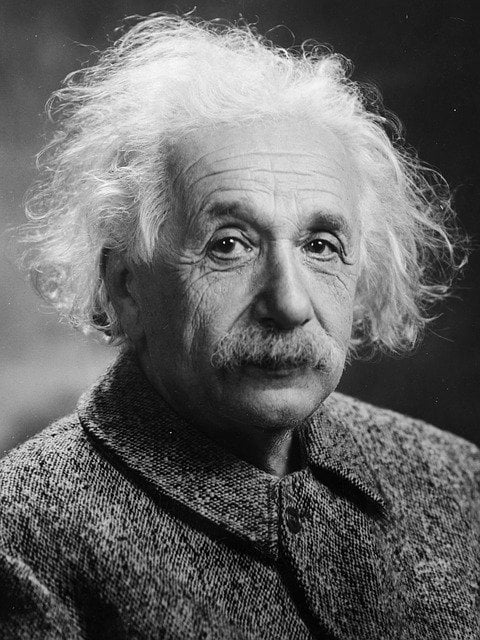Albert Einstein
Posted by: Jaksyn Peacock
Pre-listening vocabulary
- influential: important and powerful; having influence
- fascinated: very interested in something
- introduce: to make something known for the first time
- achievement: something that is completed successfully
- target: a person that a certain group wants to attack
- physicist: a scientist that specializes in physics
Listening activity
Podcast: Play in new window | Download (Duration: 1:29 — 1.4MB)
Subscribe: Apple Podcasts | More
Gapfill exercise
Comprehension questions
[wp_quiz id=”19295″]Discussion/essay questions
- Some people wanted to use Einstein’s discoveries to develop weapons, such as the atomic bomb. What is your opinion on the use of new scientific discoveries to build stronger weapons?
Transcript
Albert Einstein was one of the most influential scientists of the 20th century. He was born in Germany in 1879, and he began attending school in 1885. As Einstein got older, he became fascinated with the nature of light. He wrote his first scientific paper at the age of 16, and later went on to study physics at a university in Switzerland. In 1905, Einstein published four scientific papers. The papers introduced his theory of special relativity, which allowed scientists to better understand the connection between time and space. Einstein won the Nobel Prize in 1921 for his achievements. In the 1930s, however, Einstein became a target of the Nazi Party of Germany. He moved to the U.S. to protect himself, and continued to work as a physicist. Einstein died in 1955, but his brain is still kept in the Princeton University Medical Center. Scientists still study it today.
Search for more Listen&Learn stories:
48 comments
-
Isabel soto says:
very cute forever live
-
Juarwel says:
Reading and listening are very interesting. Both the listening and reading are helpful.
Thanks! -
saeed says:
don
-
almurr says:
thank you
-
mansour says:
thanks
-
Joaquin says:
easy
-
Tito says:
easy
-
Tito says:
easy
-
Carlos says:
I liked this office very good
-
Elia May says:
It was a great listening experience! Einstein is cool 😉
-
Mario says:
I liked this reading and listening
-
Celia says:
very good!
-
aroa says:
very good
-
ainhoa says:
very good!
-
Elizabeth says:
Excellent!😀
-
Xavier says:
Ok
-
Gerard says:
A great Merci, very useful
-
Tamer Shatla says:
very useful,
thank you. -
Destiny says:
Wow it’s really useful. Thanks a lot
-
Elie touma says:
Not bad
-
Jun says:
I’M VIETNAMESE BUT I CAN HEAR ALSO THE LISTEN EXERCISE THANKS AND WISH YOU HAVE MORE IT SO I CAN PRACTISE MY ENGLISH
-
Bastien says:
good job
-
Pisey Say says:
very useful
-
evanilde says:
just perfect : listening reading comprehension
-
Boraz Matteo says:
Bonjour
-
Yanis says:
This site is useful and easy to use.
-
Sohailz Zouhri says:
Very good ans useful
-
Fouquet Nael says:
I learned more about the greatest physicist
-
Joyce says:
so useful.Many thanks
-
GLON says:
I have two observations
first Why you don’t date your articles like before January
Second I suggest you to have all text in the window viewing including the bar listening
It will be easier to listen all the text and fill the blanks without mooving anything
Thank you
A wink from France -
Giraud Raphael says:
it was very good
-
hương says:
it help me a lot in learning
-
vann says:
can help me practise english in this disease thanku
-
Sunlee says:
great, it’s so amazing. This is the first time that i try english club.
-
Chi says:
Very useful for student, it’s simple and slow speed reading. Thanks a lots for this
-
Mei says:
very useful. It helps me a lot. Thank you!
-
Md Shahariar Chowdhury says:
it;s very useful
-
Thao says:
I can properly comprehend with slow speed reading. Thanks a lot.
-
Saadia says:
It was very interesting lesson to practice writing and listening thank you
-
Diamond says:
very good,i like study type this so much,so useful
-
lam says:
very helpful
-
Natachz says:
Thanks a lot, it’svery helpful for me, above aller vocabulary and listening.
-
Leidy says:
Thanks a lot for this , is a great useful way to practice lisening and reading understanding.
-
Mahamat Nassour Abdelkérim says:
It’s was very helpful lesson to let you to know more about knowledge.
-
Anantaya says:
It’s very useful.
-
Cate says:
Good. But transcript is not exactly the same as the listening and gapfill isn’t complete.
-
Arundhathi says:
Very simple and useful to both children and teachers
-
jessie says:
very useful